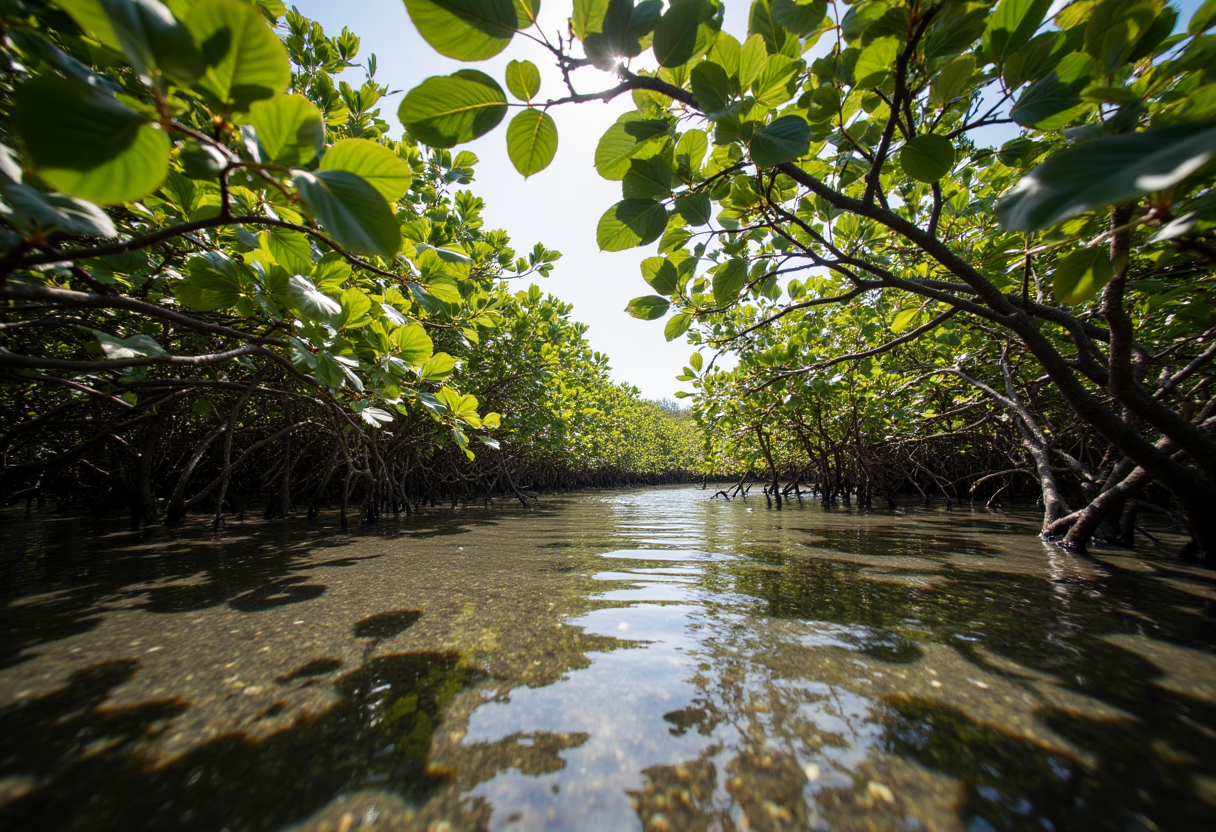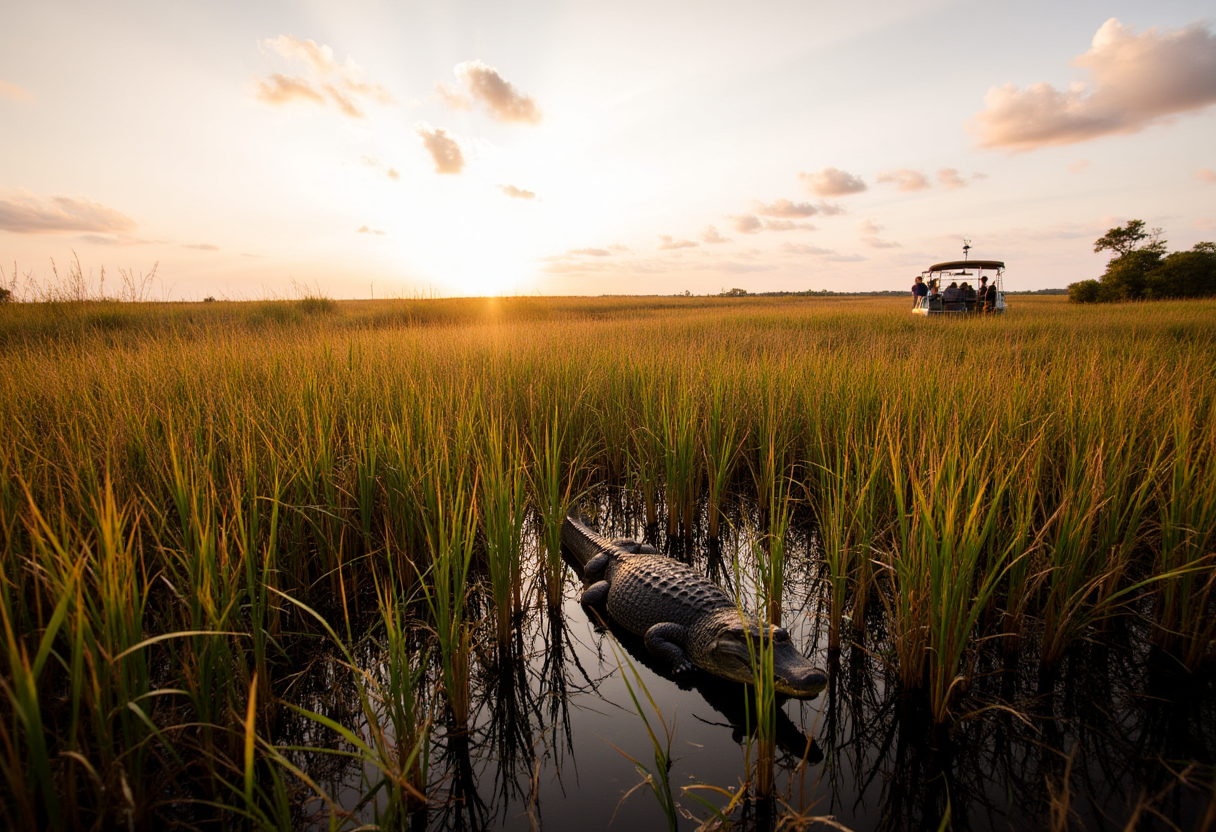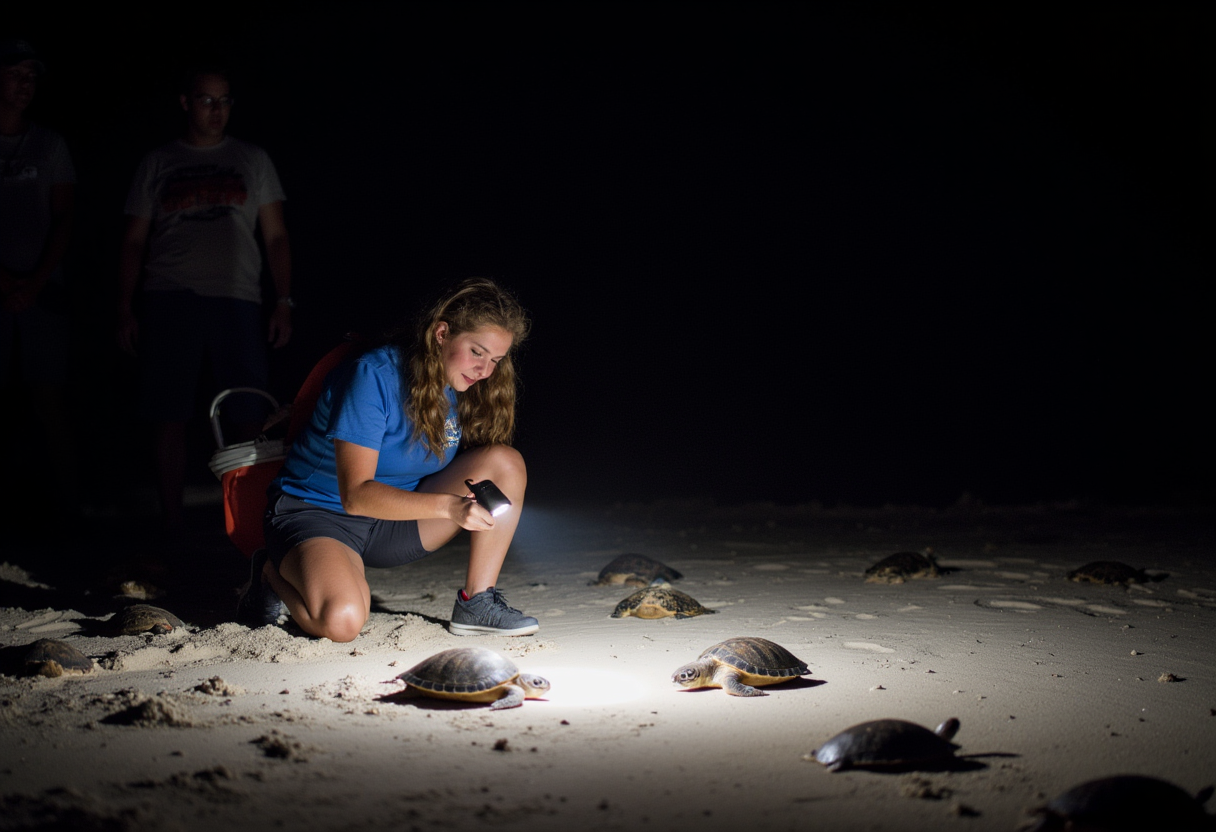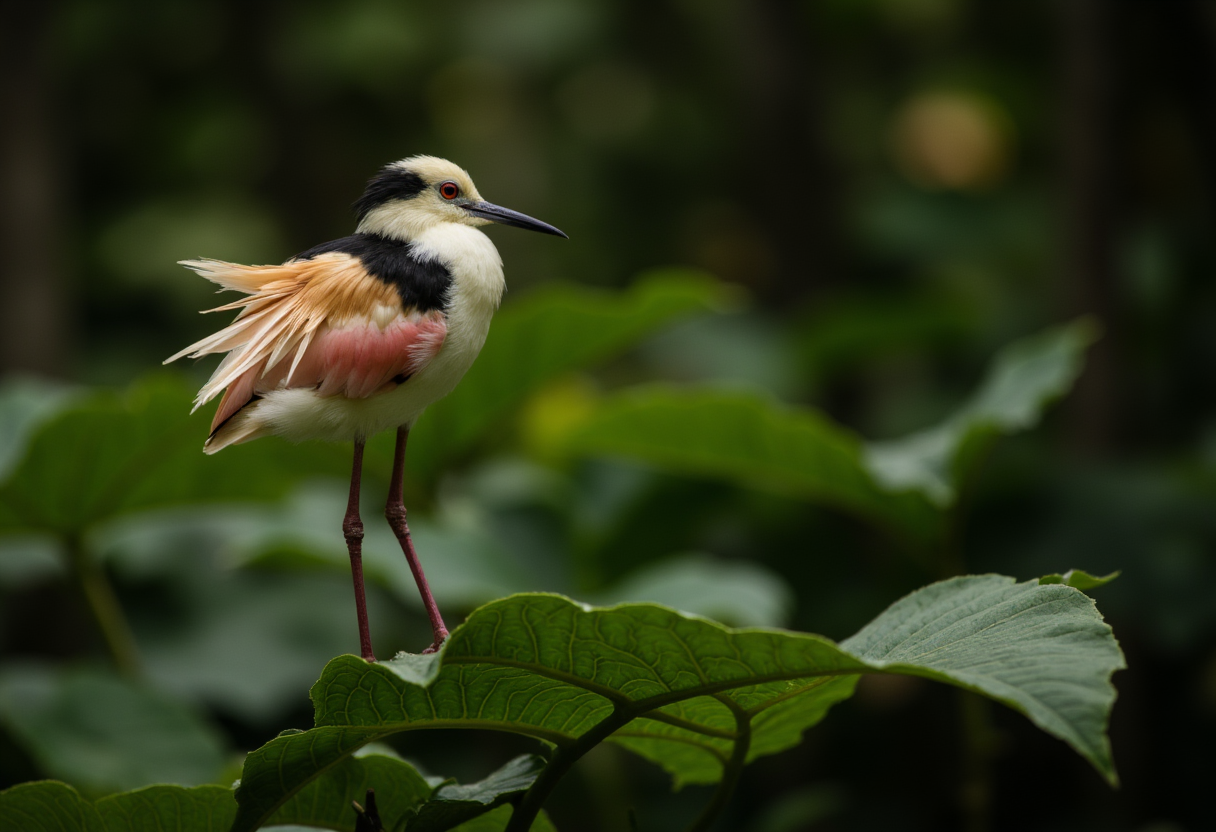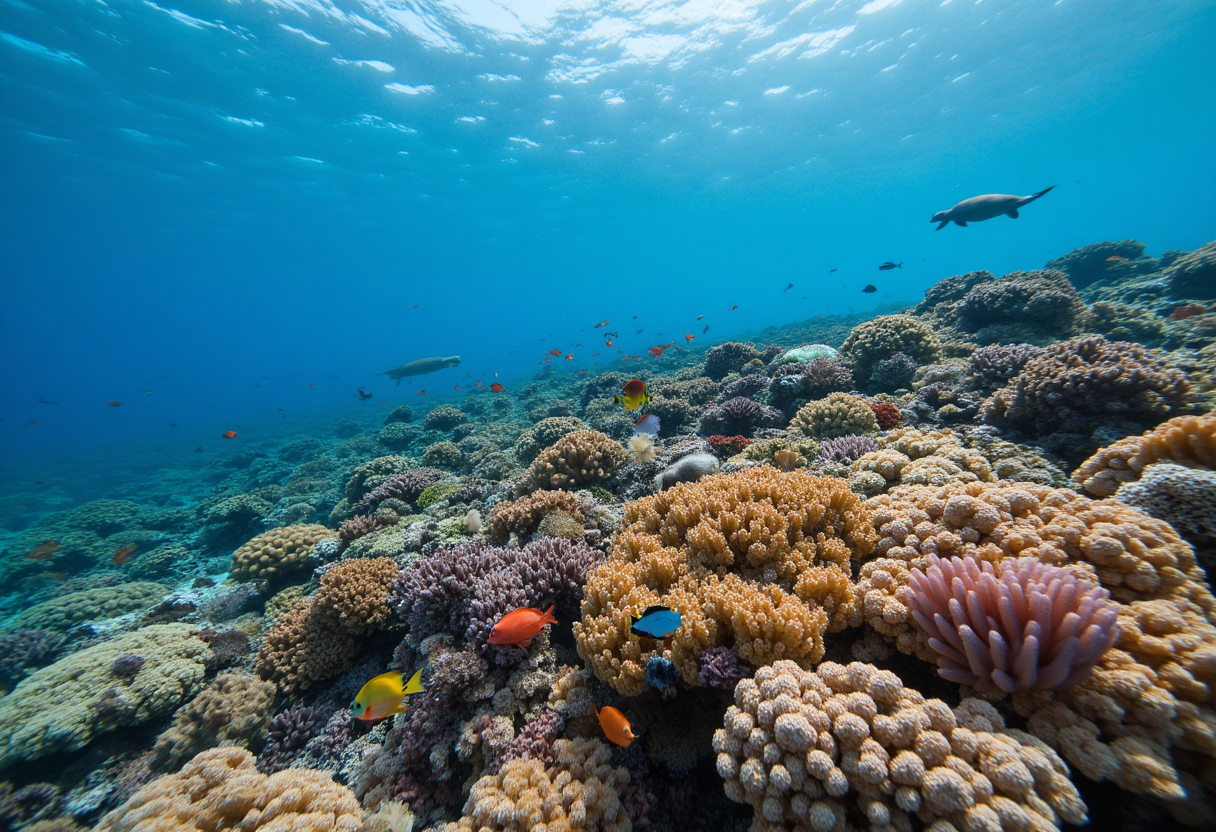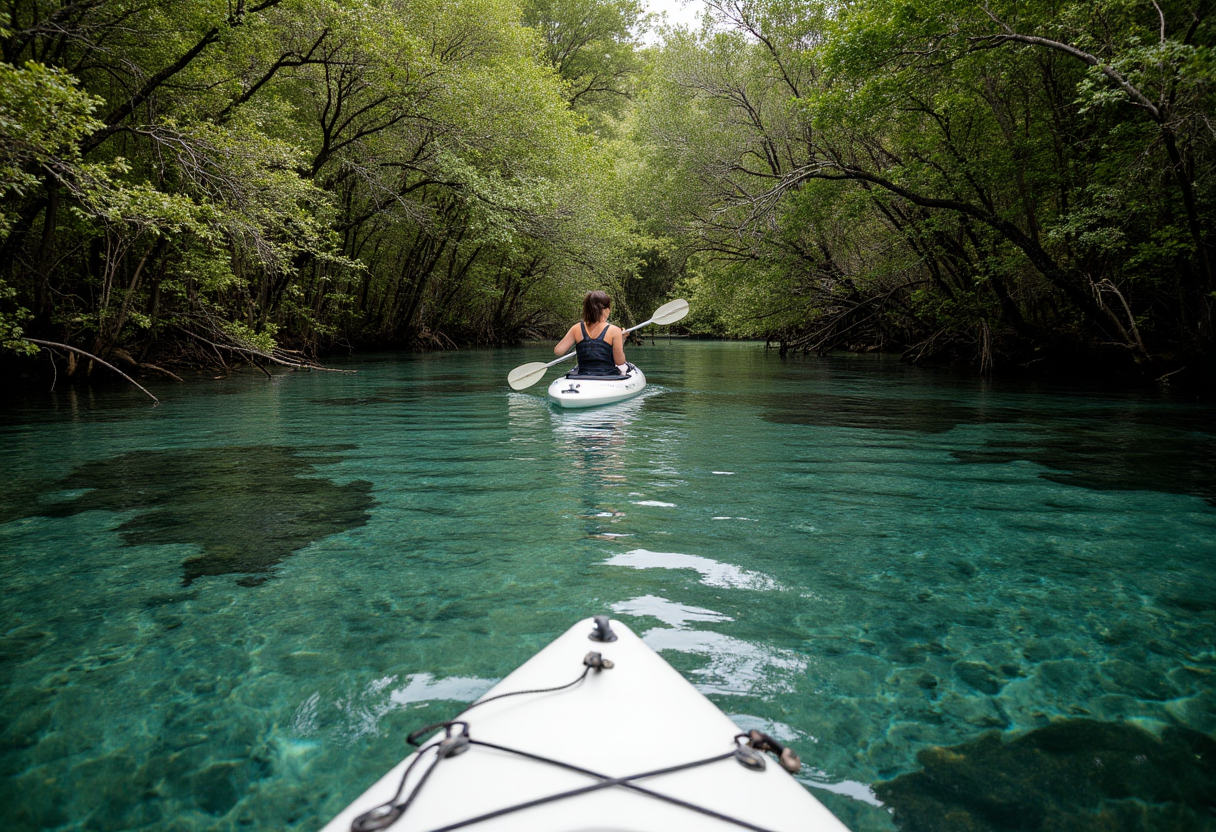The Importance of Florida's Ecotourism
Florida's natural beauty is a treasure trove for nature travel enthusiasts. With its diverse wildlife and ecosystems, the Sunshine State is a haven for those seeking sustainable tourism experiences. As Florida tourism continues to grow, it's essential to prioritize the preservation of its unique natural attractions.
shot of a healthy mangrove forest in Florida
The delicate balance between tourism and conservation is crucial. By embracing Ecotourism practices, we can ensure that Florida's natural wonders are protected for future generations.
Key Takeaways
Florida's natural attractions are a key draw for tourists.
Sustainable tourism practices are essential for preserving the state's ecosystems.
Ecotourism can help support local communities and conservation efforts.
Responsible travel can minimize the impact on Florida's environment.
Preserving natural beauty is crucial for the future of Florida tourism.
Florida's Natural Wonders: Where Alligators Have Better Real Estate Than Humans
Beyond the sun-kissed beaches and theme parks, Florida's natural wonders await discovery. The state's diverse ecosystems are a haven for wildlife, making it a paradise for nature lovers and ecotourists alike.
Beyond Theme Parks: The Wild Side of the Sunshine State
While many flock to Orlando's theme parks, Florida's wild side offers a different kind of adventure. From the vast wetlands of the Everglades to the serene beauty of the Florida Keys, the state's natural landscapes are teeming with life. Alligators, manatees, and numerous bird species call Florida home, creating a vibrant tapestry of wildlife.
A Biodiversity Hotspot in America's Backyard
Florida's unique geography, with its subtropical climate and extensive coastline, makes it a biodiversity hotspot. The state's ecosystems range from mangrove forests to coral reefs, each supporting a wide variety of flora and fauna. This rich biodiversity is not just a natural wonder; it's also a significant economic driver through ecotourism.
EcosystemNotable SpeciesConservation StatusEvergladesAlligators, Florida pantherProtected area, conservation efforts ongoingFlorida KeysDolphins, sea turtlesMarine sanctuary, protected speciesMangrove ForestsManatees, roseate spoonbillConservation areas, habitat restoration
Florida's natural wonders are a treasure trove of biodiversity, attracting visitors from around the world. By exploring and appreciating these ecosystems, we can better understand the importance of conservation efforts to protect them for future generations.
Ecotourism Explained: Why Florida is Nature's Favorite Playground
Florida's natural wonders, from the Everglades to the Keys, offer endless opportunities for responsible travel.
Ecotourism is about more than just visiting beautiful places; it's about experiencing nature in a way that supports conservation and respects local environments.
Defining Responsible Nature Travel (Without the Boring Parts)
Responsible nature travel means engaging with the natural world without harming it.
It's about being a guest in nature's home, not a homeowner who never cleans up..As one expert puts it, "Ecotourism is the art of traveling to relatively undisturbed natural areas,
to study, admire, and enjoy the scenery, its wild plants, and animals, as well as the cultural features of the local people."
"Ecotourism is the art of traveling to relatively undisturbed natural areas, with the objective of studying, admiring, and enjoying the scenery, its wild plants, and animals, as well as the cultural features of the local people."
– The International Ecotourism Society
Florida's Perfect Ecotourism Storm: Geography, Climate, and Wildlife Diversity
Florida's unique geography makes it an ideal ecotourism destination.
The state's subtropical climate, diverse ecosystems, and abundant wildlife create a perfect storm for nature lovers.
From the mangrove forests to the coral reefs, Florida's varied landscapes support an incredible array of flora and fauna.
Florida's ecotourism opportunities are vast, with numerous national parks, wildlife refuges, and protected areas.
Visitors can explore the Everglades, go kayaking in the mangroves, or snorkel in the crystal-clear springs. The state's rich biodiversity ensures that there's always something new to discover.
shot of the Everglades 'River of Grass'
The Everglades: America's Most Famous Swamp Party
Welcome to the Everglades, where the party never stops, and the alligators are always on the guest list.
This vast wetland is a true natural wonder, offering a unique blend of adventure and wildlife spotting opportunities.
Airboat Adventures: Where Alligators Are the Real Celebrities
One of the most thrilling ways to experience the Everglades is on an airboat tour. These high-speed adventures take you deep into the heart of the swamp,
where you're likely to spot alligators basking in the sun or gliding through the water.
With experienced guides at the helm, you'll get up close and personal with these incredible creatures.
The River of Grass: Ecosystem and Conservation Efforts
The Everglades, often called the "River of Grass," is a complex and delicate ecosystem. Conservation efforts are underway to protect this unique environment from the impacts of climate change and human activity. By supporting eco-friendly tour operators and conservation initiatives, visitors can play a crucial role in preserving the Everglades for future generations.
Spotting Guide: Wildlife That Might Be Watching You
As you explore the Everglades, keep your eyes peeled for the incredible diversity of wildlife that calls this place home. Some of the creatures you might spot include:
Alligators and crocodiles
Manatees and dolphins
A variety of bird species, including roseate spoonbills and bald eagles
Snakes, turtles, and other reptiles
With a little patience and knowledge, you'll be amazed at the wildlife encounters you can experience in the Everglades.
Florida's Coastal Ecosystems: Beach Life Beyond the Suntan
Beyond the sun-kissed beaches, Florida's coastal ecosystems are teeming with life and full of surprises. These ecosystems are not just visually stunning; they play a crucial role in supporting a wide range of marine life.
Sea Turtle Nesting Tours: Nighttime Magic on the Shore
One of the most enchanting experiences on Florida's coast is witnessing sea turtle nesting tours. These nighttime events are not only thrilling but also crucial for sea turtle conservation. As tourists participate in guided tours, they contribute to the conservation efforts by supporting local organizations dedicated to protecting these magnificent creatures.
nighttime scene on a Florida beach, showing a or small group observing a sea turtle hatchlings making their way to the ocean,
Coral Reef Adventures: Finding Nemo's Extended Family
Florida's coral reefs are among the most diverse ecosystems in the world
Snorkeling or diving in these reefs offers an unforgettable experience, with the chance to see a vast array of marine life,
including parrotfish, angelfish, and even sharks.
These adventures not only entertain but also educate visitors about the importance of preserving these delicate ecosystems.
Marine Conservation: How Tourists Can Help
Tourists can play a significant role in coastal ecosystems. Simple actions, such as choosing eco-friendly tour operators, not touching or standing on coral reefs, and participating in beach cleanups, can make a big difference. By making informed choices, visitors can help protect Florida's marine life for future generations.
Conservation Activity Impact: Participating in beach cleanups reduces marine pollutionChoosing eco-friendly tour operators supports sustainable tourism. Not touching coral reefs preserves coral health
Crystal Clear Springs and Rivers: Florida's Refreshing Secret
Florida's crystal clear springs and rivers are a refreshing secret waiting to be explored. These natural wonders offer a serene escape from the hustle and bustle of daily life, providing a unique blend of adventure and relaxation.
Manatee Encounters: Swimming with the Sea Cows
One of the most magical experiences in Florida's springs is swimming with manatees. These gentle giants, also known as sea cows, are a delight to encounter. During the winter months, they gather in the warm waters of places like Three Sisters Springs and Blue Spring State Park, creating an unforgettable experience for visitors.
crystal springs manatee encounters
Kayaking Adventures: Paddle Your Way Through Paradise
Kayaking through Florida's crystal clear springs and rivers is like paddling through paradise. The calm waters allow you to glide effortlessly, taking in the stunning natural beauty surrounding you. You might even spot some of the local wildlife, including manatees, dolphins, and various bird species.
Top Springs That Will Make Your Instagram Followers Jealous
Some of the top springs to visit include:
Silver Springs: Known for its glass-bottom boat tours and abundant wildlife.
Ichetucknee Springs: A favorite among tubers and kayakers.
Blue Spring: Famous for its manatee viewing opportunities during the winter.
These destinations are sure to make your Instagram followers jealous with their breathtaking beauty and exciting activities.
The Economic Impact of Ecotourism: Green Activities, Greenback Benefits
Florida's ecotourism industry is not just a boon for the environment; it's also a significant economic driver. By attracting visitors from around the world with its natural wonders, Florida generates substantial revenue and creates jobs.
Biodiversity close-up:
economic impact of ecotourism
Jobs and Revenue: How Nature Pays Florida's Bills
The ecotourism sector contributes significantly to Florida's economy through various channels. Tour guides, conservation efforts, and eco-friendly accommodations are just a few areas where ecotourism creates employment opportunities. Moreover, the revenue generated from ecotourism activities helps in maintaining and conserving Florida's natural attractions.
According to recent studies, ecotourism has become a major economic force in rural areas, where traditional industries may have declined. By supporting local businesses and promoting the value of natural resources, ecotourism helps in diversifying local economies.
Local Communities Thriving Through Sustainable Tourism
Sustainable tourism practices ensure that the economic benefits of ecotourism are equitably distributed among local communities. By engaging in eco-friendly practices and supporting local enterprises, tourists can contribute directly to the well-being of these communities.
Furthermore, the growth of ecotourism encourages the preservation of natural habitats and wildlife, which in turn supports the local economy through sustainable means. This creates a positive feedback loop where conservation and economic development go hand-in-hand.
Cultural Ecotourism in Florida: Where Nature Meets Heritage
Florida's ecotourism scene isn't just about alligators and sunshine; it's also a deep dive into the state's rich cultural heritage. As visitors explore the Sunshine State's natural wonders, they're also discovering its diverse cultural landscape.
Indigenous Perspectives: Learning from Florida's First Ecotourists
The indigenous communities of Florida have been living in harmony with nature for centuries. By engaging with these communities through cultural ecotourism, visitors can gain a deeper understanding of the state's natural environment. For instance, the Seminole Tribe offers guided tours that showcase their traditional knowledge of the Everglades ecosystem.
Historical Eco-Sites: Old Florida Through a Green Lens
Florida's historical sites are being reinterpreted through an environmental lens, offering a fresh perspective on the state's cultural heritage. The Cahokia Mounds aren't in Florida, but sites like the Bartram's Garden in St. Augustine, one of the oldest botanical gardens in the United States, provide insights into the state's ecological past.
By exploring Florida's cultural ecotourism opportunities, visitors can experience the state's natural beauty and rich cultural heritage in a unique and meaningful way.
Challenges Facing Florida's Natural Attractions
The very features that make Florida's natural attractions so appealing are also making them vulnerable to the impacts of climate change and over-tourism.
Climate Change and Rising Sea Levels: When Waterfront Property Gets Too Literal
Florida's extensive coastline and low-lying areas make it particularly susceptible to rising sea levels. As global temperatures continue to rise, the state's iconic beaches and mangrove forests are facing increased flooding and erosion.
An underwater shot of a thriving, colorful coral reef in the Florida Keys
Balancing Tourism Growth with Environmental Protection
The surge in tourism growth has brought economic benefits to Florida, but it also poses significant challenges for environmental protection. The delicate balance between welcoming visitors and preserving the state's natural beauty is becoming increasingly difficult to maintain.
Case Study: The Florida Keys' Delicate Balance
The Florida Keys offer a compelling example of the challenges facing Florida's natural attractions. This fragile ecosystem is under pressure from both climate change and the sheer volume of tourists. Efforts to protect the Keys' coral reefs and marine life are underway, but the task is daunting.
To mitigate these challenges, it's essential to adopt sustainable tourism practices and invest in environmental protection initiatives. By doing so, Florida can preserve its natural wonders for future generations while continuing to benefit from tourism growth.
Responsible Ecotourism: How to Vacation Without Being Mother Nature's Problem Child
Florida's ecotourism scene is booming, but it's crucial to ensure that our vacations don't harm the very nature we're there to enjoy. As we explore the Sunshine State's natural wonders, adopting responsible ecotourism practices is not just a good idea – it's essential.
Eco-Friendly Accommodations and Tour Operators
Choosing where to stay and who to tour with can significantly impact the environment. Opt for eco-friendly accommodations that have implemented sustainable practices, such as energy-efficient lighting and waste reduction programs. When selecting tour operators, look for those that follow responsible ecotourism guidelines, such as minimizing wildlife disturbance and supporting conservation efforts.
Practical Tips for Minimizing Your Environmental Footprint
Reducing your environmental footprint while on vacation is easier than you think. Here are some practical tips:
Use reusable water bottles and bags
Choose tours that support local conservation
Respect wildlife and their habitats
Reduce energy consumption by turning off lights and air conditioning when not in use
ActionImpactUsing eco-friendly sunscreenProtects coral reefsNot feeding wildlifeMaintains natural behaviorsStaying on marked trailsPrevents habitat destruction
By being mindful of our actions and choosing responsible ecotourism practices, we can enjoy Florida's natural beauty while preserving it for future generations.
The Future of Florida's Ecotourism: Innovation in Conservation
Florida's ecotourism is on the cusp of a revolution, driven by innovative conservation efforts. As the industry evolves, it's becoming clear that technology and nature are not mutually exclusive, but rather complementary forces that can enhance the ecotourism experience.
Technology and Nature: From Apps to Conservation Maps
The integration of technology in ecotourism is opening new avenues for conservation. Conservation apps and interactive maps are helping tourists navigate and appreciate Florida's natural wonders while providing valuable data for conservationists. For instance, apps that track wildlife sightings can help monitor populations and habitats.
Emerging Destinations Off the Beaten Path
As ecotourism grows, there's a shift towards exploring lesser-known destinations. Emerging eco-destinations in Florida, such as hidden springs and untouched wetlands, are becoming increasingly popular. This trend not only diversifies the ecotourism landscape but also distributes the economic benefits more widely.
Preparing for Climate Challenges While Preserving Access
One of the critical challenges facing Florida's ecotourism is climate change. Rising sea levels and more frequent storms threaten both the natural attractions and the infrastructure that supports tourism. Adaptive conservation strategies are being developed to mitigate these impacts, ensuring that Florida's natural beauty remains accessible to future generations.
Conclusion: Why Protecting Florida's Natural Wonders Benefits Everyone
Florida's natural wonders are a treasure trove of biodiversity, attracting millions of visitors each year. Protecting these natural wonders is crucial for preserving the state's unique ecosystem and supporting local communities that rely on ecotourism.
By promoting responsible ecotourism practices and conservation efforts, we can ensure the long-term sustainability of Florida's natural attractions. This not only benefits the environment but also generates revenue and creates jobs for local residents, highlighting the clear benefits of conservation.
As we move forward, it's essential to strike a balance between tourism growth and environmental protection, ultimately preserving Florida's natural heritage for future generations. By doing so, we can continue to reap the rewards of protecting natural wonders, from thriving ecosystems to a robust local economy.
Further Reading & References
Explore More Florida Stories:
Sustainable Adventures in the Everglades
Magical References & Attributions:
The International Ecotourism Society – What Is Ecotourism?
Florida Department of Environmental Protection – Florida’s Natural Lands & Parks
Visit Florida – Ecotourism in the Sunshine State
FAQ
What is ecotourism, and why is Florida a great destination for it?
Ecotourism is responsible travel to natural areas that conserves the environment and improves the well-being of local people. Florida is a great destination for ecotourism due to its unique geography, climate, and biodiversity, offering many opportunities to explore its natural wonders.
a person kayaking on a crystal-clear Florida spring
What are some popular ecotourism activities in Florida?
Popular ecotourism activities in Florida include airboat tours in the Everglades, sea turtle nesting tours, coral reef adventures, kayaking through crystal-clear springs, and manatee encounters.
How can I minimize my environmental footprint while enjoying Florida's natural beauty?
To minimize your environmental footprint, choose eco-friendly accommodations and tour operators, reduce your use of plastics, respect wildlife and their habitats, and follow guidelines provided by local conservation efforts.
What are some challenges facing Florida's natural attractions?
Florida's natural attractions face challenges such as climate change, rising sea levels, and the need to balance tourism growth with environmental protection. Conservation efforts are crucial to preserving these areas.
How does ecotourism benefit local communities in Florida?
Ecotourism benefits local communities by generating revenue and creating jobs, promoting sustainable tourism practices, and supporting conservation efforts that preserve Florida's natural heritage.
What role does technology play in Florida's ecotourism?
Technology plays a significant role in Florida's ecotourism by providing tools such as conservation maps, wildlife tracking apps, and online platforms that promote eco-friendly tour operators and accommodations.
Can I participate in conservation efforts while visiting Florida?
Yes, visitors can participate in conservation efforts by supporting local conservation organizations, participating in citizen science projects, and choosing tour operators that follow sustainable and responsible tourism practices.
Are there any emerging ecotourism destinations in Florida?
Yes, there are emerging ecotourism destinations in Florida, including off-the-beaten-path locations that offer unique opportunities to explore the state's natural beauty while promoting sustainable tourism practices.
Earl Lee
Florida Unwritten

